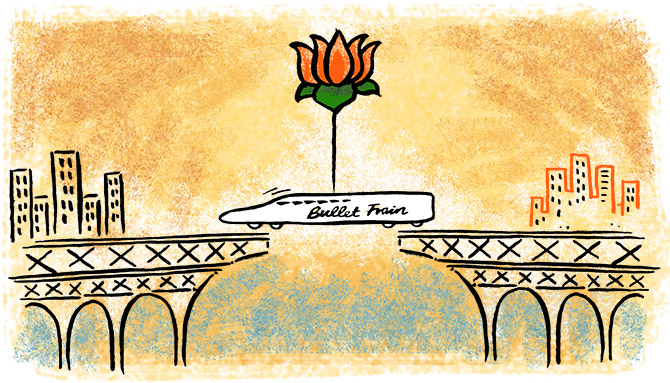 | « Back to article | Print this article |
Apart from land acquisition, another major cause for concern before the project is cost escalation owing to a fall in the rupee against the Japanese yen.

Despite facing public protests and resistance from the Maharashtra government, the country’s first bullet train project between Ahmedabad and Mumbai has been able to acquire almost 60 per cent of the land required for the project.
However, meeting the December 2023 deadline is still a cause for concern for Prime Minister Narendra Modi’s pet project on the back of the Covid-19 outbreak.
“We are on fast track. We have acquired 60 per cent of the land required for the project. Interestingly, in Gujarat it goes up to around 77 per cent,” said Achal Khare, managing director of the National High-Speed Rail Corporation (NHSRCL), the company in charge of India’s bullet train road map.
The total land requirement for the Mumbai-Ahmedabad high-speed rail corridor project was reduced to 1,380.08 hectares (ha), from 1,434.47 ha late last year, mainly due to actual reconciliation of the project scope.
Of the total land required, 1,004.91 ha is private land. So far, around 820-830 ha has been acquired by NHSRCL.
The government has signed a loan agreement with the Japan International Cooperation Agency (JICA) for providing Rs 15,000 crore, of the total loan amount of Rs 88,000 crore.
The estimated total cost of the Mumbai-Ahmedabad project is Rs 1.08 trillion, of which 81 per cent cost is planned for funding through the loan from JICA.
The project is on track, despite strong opposition from Maharashtra Chief Minister Uddhav Thackeray.
“If someone gives a loan without interest or loan with minimal interest, that does not mean we take it and snatch land from farmers. This is a white elephant,” Thackeray said in an interview to Marathi daily Saamana.
“A large chunk of land acquisition is complete. Ironically, people’s queries are not answered in social impact and environment impact hearings.
"In Gujarat, it is a forceful acquisition of land and in Maharashtra, too, the government has changed the rules from the earlier model of direct purchase.
"Even now, acquisition in areas like Palghar in Maharashtra and Navsari in Gujarat may be a difficult task for the authorities,” said Krishnakant Chauhan, an office-bearer of the National Alliance of People’s Movements.
Apart from land acquisition, another major cause for concern before the project is cost escalation owing to a fall in the rupee against the Japanese yen.
Moreover, farmers in Maharashtra were asking for a higher compensation package.
The 508.17-kilometre long network will pass through three districts (Mumbai, Thane, and Palghar) in Maharashtra and eight districts (Valsad, Navsari, Surat, Bharuch, Vadodara, Anand, Kheda, and Ahmedabad) in Gujarat.
The alignment also passes through a small section falling in the Union Territory of Dadra and Nagar Haveli.
Though the state government of Maharashtra was showing discontent, it had recently amended state land rules to start the process of acquisition as direct purchase of land was taking too much of time.
Last year, the company had floated nine civil work tenders, which Khare said would be opened by the end of July or early August.
One of the civil work contracts for construction of stations, bridges, viaducts, maintenance depots, and tunnels across the network is to the tune of Rs 20,000 crore.
However, key tenders, including Shinkansen technology like electrical, rolling stocks, signaling, and tracks, will be open to only Japanese companies.